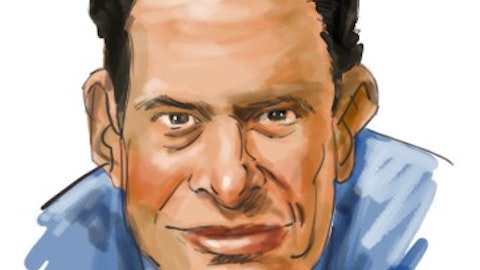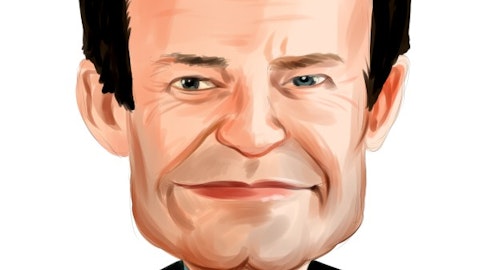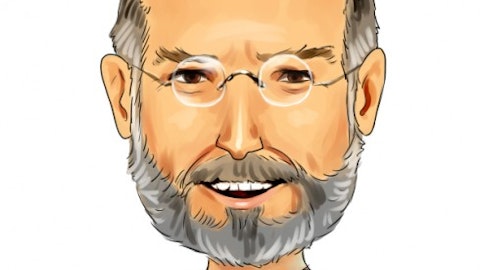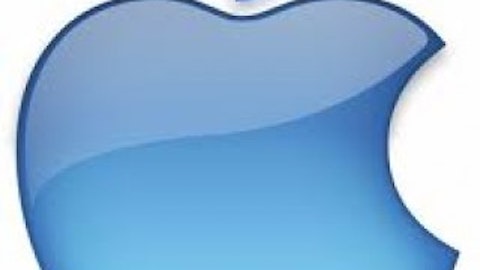Last quarter we saw Dell Inc. (NASDAQ:DELL) pass Hewlett-Packard Company (NYSE:HPQ) in our hedge fund ownership rankings, which include 400 of the world’s most preeminent hedge funds. For 3Q, Dell had 42 funds invested after a net increase of 4 filers. Meanwhile, HP saw a net decrease of 5 filers and now only has 40 big-name funds owning the stock. Ray Dalio, billionaire and founder of Bridgewater Associates, loves both Dell and HP, and increased his stake in each by double-digits last quarter (see Ray Dalio’s other top picks here).
Dell reported so-so 3Q results, missing the Street’s EPS estimates by 2.5%. Top line revenue and operating income took large hits, which have pushed shares of the company down by nearly 15% over the past six months. The big fundamental problem for Dell and HP has been the cannibalization impact that smartphones and tablets have had on PCs. Couple this with a weak economic backdrop that has led to low IT spending, and it is easy see why both PC makers are down at least 25% year to date.
Acquisitions will be one of the big differentiators for HP and Dell. Inorganic growth continues to help Dell diversify its operations to a greater degree than HP. In layman’s terms, Dell’s acquisitions involve moving away from the computer-making business and embarking into the software industry. Part of this initiative has already been put in place with the recent acquisition of Quest Software for $2.4 billion. Dell hopes to also pivot its PC business to products with higher growth potential, which include tablets and ultrabooks. One recent innovation of the company has been its release of a ultrabook-tablet combo, the XPS 12.
HP, meanwhile, is expected to see revenues down 10% in FY2013. The company has already announced restructuring plans that have forced its long-term expected earnings growth rate to essentially zilch. Restructuring initiatives should save HP upwards of $3.5 billion, but not until after 2014. Billionaire Jim Simons is one of Hewlett’s biggest backers (check out Jim Simons’ other top picks).
When digging deeper into the Dell-HP saga we see that the former leads its fellow computer company in many areas. Dell’s dividend yield of 3% is only a 29% earnings payout, whereas HP’s 3.6% dividend yield is rich given its negative earnings. Dell also operates with a long-term debt-to-equity ratio that is nearly half (52%) that of HP (97%).
We believe that Dell’s discounted 6x forward P/E is warranted given the near term uncertainty, but with an expected earnings growth rate that is around 6% – PEG of 1.0 – the PC maker still offers investors growth at a reasonable price. We see Dell as the ‘best house in a bad neighborhood,’ and expect it to hold up better than HP in the interim. Billionaire Carl Icahn has been rumored to be building a position in HP (see our thoughts).
Looking further in this space, we stare straight in the faces of Microsoft Corporation (NASDAQ:MSFT) and Apple Inc. (NASDAQ:AAPL), two of the giants in the tech industry. They are also two of the top ten tech stocks loved by hedge funds (see all 10). Microsoft provides software for PCs and is attempting to gain a footing in the tablet industry, while hoping that Windows 8 sales will be strong over the holidays. Microsoft does not provide robust growth like Apple, but it is a solid value play. Microsoft pays one of the more stable dividends of the tech companies with a 3.4% yield and a 37% payout. Couple this with its 8x forward P/E and solid 9% long-term growth rate and it is easy to see why the stock is a hedge fund favorite. Microsoft calls billionaire Ken Fisher – founder of Fisher Asset Management – as one of its biggest investors (check out Ken Fisher’s newest picks).
Apple, on the other hand, is one of the biggest culprits for the market share losses experienced by HP and Dell. Not only are Apple’s PC products growing in volume, but its tablet and smartphone offerings are decreasing the need for PCs in certain circumstances. Apple is undeniably one of the better opportunities in the market from a valuation and expected growth standpoint. Apple trades at only 9x forward earnings, but boasts a 20% long-term expected EPS growth rate. Apple even appears cheap from a technical perspective, with a major market technician calling for a return to $700 (see more about this bullish call here).
Though it doesn’t receive much hype, Cray Inc. (NASDAQ:CRAY) is one of the best high-growth stories in the computer manufacturing business. The supercomputer company is expected to grow EPS by at least 20% a year over the next half-decade. Shares of Cray are up 125% year to date, though we remain cautious on the tech company given its valuation; it’s trading at 38x forward earnings. Mega-investor Steven Cohen and SAC Capital appear to be unimpressed with the stock, selling off their entire stake last quarter (check out Steve Cohen’s other big bets).
Clearly, the near-term pressures facing major PC makers are not over, and an investment in either Dell or HP would be a long-term market move. With that being said, we believe that the “smart money” is correct on the call that Dell will outperform HP.






